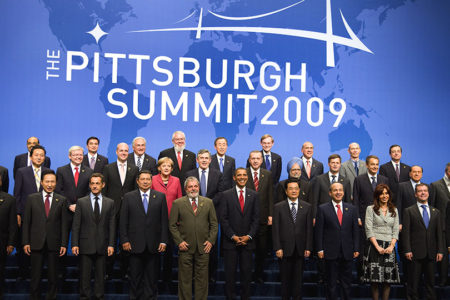History Through the ‘Apple of His Eye’
In the mid 1990s, Steven Spielberg produced a cartoon series about two laboratory mice. One was incredibly smart; the other was clueless. Each episode revolved around the smart mouse devising a harebrained scheme to “try to take over the world.” It was amusing to watch Pinky and the Brain and their ridiculous attempts at world domination.
Trying to take over the world is a theme that runs through human history, literature, and even the Word of God. From Earth’s earliest days, many men have wanted nothing more than to rule the planet. Several have come perilously close, with each attempt affecting the history of His Chosen People—the “apple of His eye” (Zech. 2:8). Here are a few examples.
Nimrod
After the fall of man in the Garden of Eden, Satan exploited humanity’s lost condition by bringing to power men with arrogant, rebellious hearts. One was Nimrod who the Bible says, “began to be a mighty one on the earth. He was a mighty hunter before the Lᴏʀᴅ; therefore it is said, ‘Like Nimrod the mighty hunter before the Lᴏʀᴅ’” (Gen. 10:8–9).
The beginning of Nimrod’s kingdom was Babel, in what today is Iraq. From there he went to Assyria and built Nineveh and other cities (vv. 11–12). Babel is possibly the first reference in Scripture to Babylon. Both Nineveh and Babylon were located near the Euphrates River and played major roles in separating God’s Chosen People from their land.
Nineveh was the capital of the Assyrian empire, which conquered the northern kingdom of Israel in 722 B.C. Babylon brought to an end the last vestiges of Jewish independence when it captured the southern kingdom of Judah in 586 B.C. under Nebuchadnezzar.
So two of the cities Nimrod established carried the Jewish people off to captivity. Wrote Bible commentator Allen P. Ross: “Because his name seems to be connected with the verb ‘to rebel,’…tradition has identified him with tyrannical power. He was the founder of the earliest imperial world powers in Babylon and Assyria.”1
Alexander the Great
Alexander III of Macedonia (or Macedon) had a genuine, voracious desire to rule the world. Born in July 356 B.C., Alexander never lost a battle, making him one of the world’s most successful military commanders. By the time he died in 323 B.C., he had conquered most of the known world.2 His empire reached from the coast of Gibraltar near Spain all the way to what is today Pakistan.
Although Alexander was kind to the Jewish people, his vast empire promoted Greek gods and Greek language, philosophy, and culture. Greek became the primary language until long after the time of Christ. Hebrew fell into disuse and was retained mainly by the Pharisees and Jewish priests.
Between 281 and 150 B.C., the Hebrew Scriptures were translated into Greek to make them accessible to the Hellenistic Jews. The Septuagint (LXX) is the Greek translation of the Old Testament that is quoted in the New Testament, which was originally penned in Greek.
Unfortunately, Greek culture became so prevalent that many Jewish people assimilated, adopting Hellenistic practices, forsaking Jewish ones, and even changing their names. Later, under Antiochus IV, those who refused to assimilate were viciously persecuted and killed, leading to the rise of the Maccabees who freed the Jewish people from tyranny and cleansed the defiled Temple in Jerusalem. Their rule became the Hasmonean dynasty and yielded the holiday of Hanukkah.
The Roman Empire
Greek dominance ultimately ended with Cleopatra’s defeat in 3 B.C., allowing for the emergence of the next major world power: Rome. The first real emperor of the Roman Empire was Caesar Augustus who ruled from 63 B.C. to A.D. 14. He ruled when Jesus was born (Lk. 2:1).
It was Rome that destroyed the second Jewish Temple in A.D. 70; expelled the Jewish people from Jerusalem; and, in A.D. 135, renamed Judea and Galilee “Palestina,” stripping the land of its Jewish heritage and giving it to the Philistines. Rome continued to rule the known world until its decline centuries later.
Napoleon Bonaparte
From that point on there were no major empires. Europe was trapped in the medieval world of feudalism often identified as the Dark Ages, or Middle Ages. The real power was vested in the Papacy.
There was an attempt to unify part of the former Roman Empire. This loose association was known as the Holy Roman Empire. It dissolved in 1806, as France’s Napoleon Bonaparte waged war through Europe. Prior to his defeat at Waterloo, Napoleon declared, “I wanted to rule the world—who wouldn’t have in my place?”
Napoleon was good to the Jewish people. He emptied the ghettos of France and allowed them to live wherever they wanted. Wrote historian Ben Weider: “The Jews felt free at last.”3
In 1799, calling them the “rightful heirs of Palestine,” Napoleon intended to restore the Jewish people to their ancient homeland of Israel, under French protection.4 Although his troops were in Palestine, he could not capture the town of Acre nor issue his proclamation from Jerusalem, as he had planned, due to British intervention.5 Wrote Weider:
The Jews had to wait more than 150 years before their state was proclaimed.
The [Napoleon’s] proclamation, however did bear fruit. It was a precursor to Zionism, heightening awareness of the cause of Jewish statehood. The ideas Napoleon expressed found the admiration of many who saw Napoleon’s gestures as a fulfillment of Biblical prophecy, which foretells of the restoration of the Jews to their land. The idea drew many adherents, especially in England.
One hundred and eighteen years later, the British would issue the “Balfour” declaration which called for a Jewish homeland and ultimately—31 years later in 1948—Israel would be recognized as a sovereign state by popular vote in the United Nations General Assembly. Perhaps it can be said that Napoleon’s premature announcement on that first day of Passover in 1799 played an important role in the creation of the state of Israel.6
ENDNOTES
- Allen P. Ross, “Genesis,” The Bible Knowledge Commentary, ed. John F. Walvoord and Roy B. Zuck (Wheaton, IL: Victor Books, 1985), 2:43.
- “The Empire of Alexander the Great Map” <biblestudy.org/maps/empire-of-alexander-the-great-map.html>.
- Ben Weider, “Napoleon and the Jews,” The International Napoleonic Society, June 1997 <napoleon-series.org/ins/weider/c_jews.html>.
- “Napoleon Bonaparte’s Letter to the Jews, April 20, 1799,” “Letter to the Jewish Nation from the French Commander-in-Chief Buonaparte (translated from the original, 1799) <mideastweb.org/napoleon1799.htm>.
- Weider.
- Ibid.







